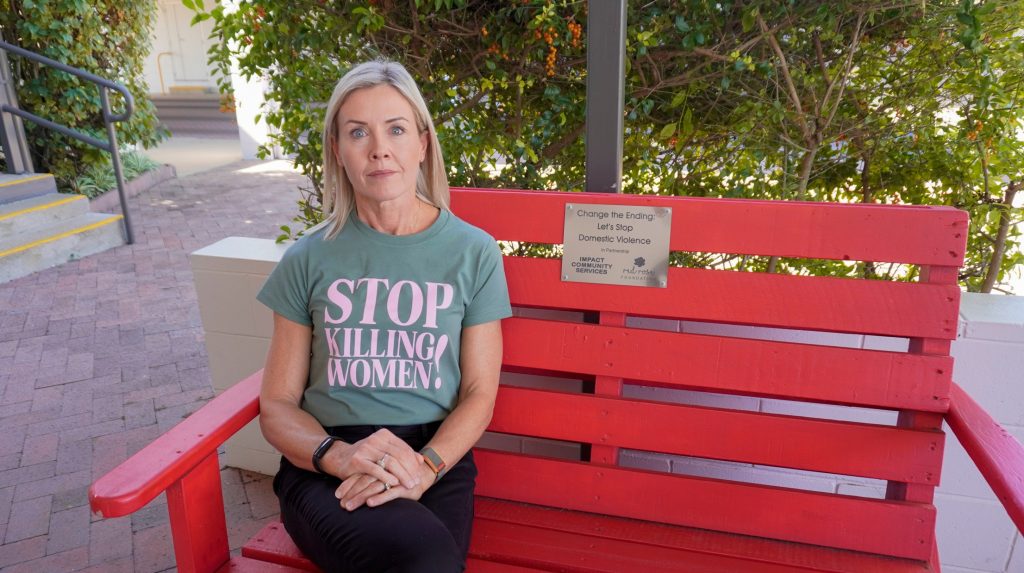- Home
- Stronger Together
- Support & Wellbeing
- Disability & NDIS
- Mental Health
- Families & Parenting
- Support for Individuals
- Community Health
- Employment & Training
- About Us
- About us
- Get Involved
- Governance
- Social Enterprises
"STRONGER TOGETHER" is a weekly column where Tanya explores key issues. This week Tanya discusses the urgent national crisis of domestic, family, and sexual violence, emphasising its pervasive impact on society and the necessity for collective action and cohesive support systems.
By IMPACT Community Services Managing Director Tanya O'Shea

Dear Reader
As I sit before this blank screen, pondering the recipient of this address, I find myself at a crossroads. Should it be the Prime Minister, Anthony Albanese? Perhaps Queensland Premier Steven Miles? Or maybe a more generic “To whom it may concern”?
Yet, when I delve into the heart of the matter, I realise that this issue is, well, not just about getting the attention of politicians. This issue transcends gender, is more than planting barbs in online comments and will not be solved by pretending that the issue doesn’t affect us. Because chances are you know someone who has been a victim, survivor, or perpetrator of domestic violence, and therefore the insidious nature of this behaviour demands that we all take notice.
Domestic, family, and sexual violence is a national crisis that requires immediate and unwavering attention. It is a scourge that erodes the very fabric of our society, sparing no demographic or community. And it's not just physical violence—DFSV refers to any behaviour that coerces, controls, or causes fear.
Yes, the statistics are alarming. On average in 2022-23, 1 woman was killed every 11 days, and 1 man was killed every 91 days by an intimate partner. People – real people and their families have paid the ultimate price. People like Molly Ticehurst, Rebecca Young, Alison Baden-Clay, Hannah Clarke, Aaliyah, Laianah, and Trey resonate as reminders of the tragic outcomes of such violence.
People like a mother in Lismore, who earlier this week handed over her two-year-old toddler to his father for an access visit, and she will never see her baby again. There was an apprehended domestic violence order (ADVO) in place.
May is Domestic and Family Violence Awareness Month and in the leadup, both the Federal and State Governments have acknowledged the nation is in the grips of a crisis and something needs to be done.
Prime Minister Anthony Albanese has reiterated his commitment to the "National Plan to End Violence Against Women and Children 2022-32" by extending the Escaping Violence Program and introducing the Leaving Violence Program, which offers financial aid to those exiting abusive relationships. Additionally, the government has broadened support for single parents, legislated 10 days paid leave for domestic violence, enhanced rent assistance, and is investing in crisis accommodation and affordable housing to aid women and children escaping violent situations.
Likewise, Queensland Premier Steven Miles, announced significantly increased funding in this area with the Government's Plan for the Primary Prevention of Violence Against Women 2024-28 and the establishment of a new peak body for domestic and family violence, the Queensland Council of Social Services. This follows the introduction of new laws criminalising coercive control.
Bravo Mr Albanese and Mr Miles. Thank you Minister Rishworth and Minister D’Arth. These announcements reflect a strong commitment from both levels of government to create safer communities and support those affected by domestic and family violence. This dedication is commendable and greatly appreciated.
But here is the thing. Government’s often work in isolation without considering how their decisions will align to other stakeholders – even other levels of Government.
What does this mean? Here is a real-life case study for you to consider.
A woman and her child flee partner violence, are supported to leave their family and home in another state and move to Queensland. Due to the nature of the violence, the family are listed on the Evatt List, created to protect families and individuals at high risk of family violence. In her case, the perpetrator wants access to the child. He asked his lawyer to subpoena her records, and because the lawyer didn’t do the appropriate checks, the lawyer provided all of the confidential information about the woman and her child to the perpetrator.
Puzzling isn’t it.
The same woman also accessed the Escaping Violence Program’s aid to start anew and was then told that because she accessed the payment and she was working full time, she was unable to access Legal Aid or any other financial assistance. In comparison, the perpetrator has had all of his legal costs covered.
Feeling perplexed about these situations is no longer enough. This story underscores the dire need for a more cohesive system that doesn’t force survivors to choose between safety and legal recourse, a choice no family should ever confront.
Earlier this week, we joined forces with The Outback Mind Foundation, Small Steps for Hannah, Bundaberg Regional Council, and Queensland Police, for the screening of 'Boiling Point', a documentary that shares the stories of men who have previously used violence as a form of communication in their relationships but managed to turn their lives around. This was followed by a Q&A with an expert panel.
At IMPACT we want to do more. We realise that we need to elevate the voices of people with lived experience so that we can advocate and work alongside them, ensuring their voices are heard and their experiences validated.
Acknowledging the issue is merely the initial step; it’s sustained, collective action that leads to meaningful change. As ‘Domestic and Family Violence Awareness Month’ draws to a close, I urge you to continue the momentum of advocacy and reform. The path ahead is long, the work will be hard, but it is through our unwavering commitment to end domestic and family violence that we can ensure a safer future for all. It's up to every one of us.
Yours sincerely
Tanya